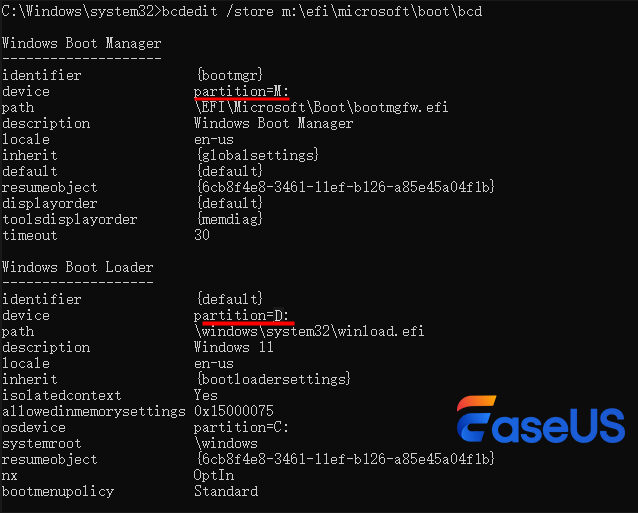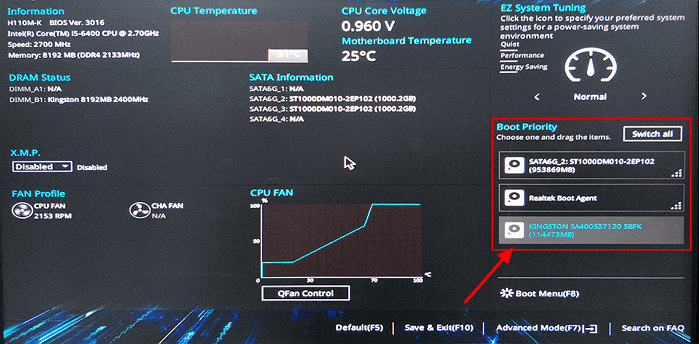Start Your Free Trial!
Sign up to our newsletter, stay updated on news and exclusive offers from EaseUS. Don't worry, if you change your mind, you can unsubscribe at any time, free of charge. We value your privacy (Privacy Policy).
Page Table of Contents
Can I Migrate OS for Free? Yes, You'll Need Free OS Migration SoftwareHOT
#1. Get Everything Ready for Migrating OS for FreeHOT
#2. Use Free OS Migration Software to Transfer OS to New DiskHOT
#3. Create and Build a New System Partition to Boot Windows on the New DiskHOT
#4. Configure Computer to Boot OS from New DiskHOT
ConclusionHOT
About the Author
Hot Topics
Updated on Apr 28, 2025
With the advancement of technology, many users may want to upgrade or switch their storage drives to a larger SSD or upgrade to improve speed. The difficulty arises when you need to move your whole operating system, apps, and files without having to reinstitute everything from scratch. Here, you can find the right OS migration tools!

Finding dependable and effective software can be a game-changer for consumers wishing to migrate their Windows 11 or 10 computers to another drive seamlessly and without cost. This article will discuss the top free OS migration program that lets you quickly move your system to a new drive. Join me to learn the best free download choices and how to transfer your OS without data loss using them.
Yes, you can move your OS to a new disc for free! Even if you're not running OEM Windows, all Windows users can move their OS between discs. This is useful when upgrading to a faster SSD or larger hard disc without reinstalling.
However, most OS migration applications must be purchased to unlock the most effective and seamless ways to move your OS to another drive without reinstalling it. Inexperienced users can pick paid software because it simplifies the procedure and offers superior technical support.
For such an operation, EaseUS Partition Master Professional is reliable and straightforward for both beginners and expert users. Its Migrate OS feature makes moving Windows to a new disc easy and secures your files, settings, and system preferences.
If you don't mind a more complicated process, EaseUS Partition Master Free Edition is a superb free OS migration application. The free edition lacks Migrate OS, but it can Clone Partition, which copies your OS partition, boot volume, and data discs step-by-step to a new disc. Though manual this solution works.
Start by downloading the EaseUS Partition Master Free Edition on your PC, and follow the steps shared in this guide to migrate your OS to a new disc safely. Also, don't forget to sharing this free os migration software online to help more of your friends moving their OS to another disk for free:
Ensure you have everything ready before starting the operating system migration process. To ensure a seamless process, adhere to this checklist:
| ✔️Get a new HDD or SSD: | Verify that the new disc fits properly in your computer and has more storage space than your existing OS drive. |
| ✔️Set up new disk: | To prevent boot problems, initialize the new disc to the same partition style as your existing operating system disc (either MBR or GPT). |
| ✔️Back-up files: | To prevent losing vital information during conversion, always make a backup copy of your essential data from your old OS storage. |
| ✔️Clean and remove useless content: | Delete programs and garbage files to free up space. This will prevent unwanted data from being transferred and speed up the migration. |
| ✔️Find the Windows product key: | If needed, find your Windows product key and save it to an external device. |
Following these procedures, you'll be well-prepared to migrate your OS without problems.
Once you are set to start the migration procedure, following a few basic steps will help ensure a successful conversion of your operating system.
Before beginning the migration, create the same number of partitions on the new disk as on your previous system disk. This will help preserve the organization and structure of your data after the transfer, facilitating its management. EaseUS Partition Master Free Edition can create partitions for you in only a few simple clicks.
Once your partitions are configured, you can copy each partition from your old OS disk to the new one by using EaseUS Partition Master Free Edition. This approach guarantees precise replication of all your data, programs, and system settings on the new disc, enabling a simple transfer.
These steps will help you migrate your OS without any problems:
Step 1. In EaseUS Partition Master, select "Disk Clone" from the left menu. Click "Clone Partition" and "Next".
Step 2. Select the source partition you want to clone from and click "Next".
Step 3. Choose your the target partition and click "Next "to continue.
Step 4. Click Start and wait for the clone to complete.
You can check how to clone partition or system reserved partition on this video tutorial.
Note: Repeat the operation procedure to clone all existing partitions to the new disk volumes if you plan to clone the entire OS disk.
To ensure your PC can boot from the new drive, you'll need to perform a few extra steps if you transfer your operating system and boot volumes to the new disc using the clone partition approach. To create and configure the new system partition, adhere to these guidelines:
1. Create a new partition: On the destination disc, start by making a new partition the same size as your previous system partition. This will guarantee sufficient room for all required system files.

2. Build a new partition as the system partition: You must designate the newly formed partition as the system partition. This step is necessary for your computer to detect and boot from the new disc.

3. Check the system and boot volumes: Lastly, confirm that the new disk's boot and system volumes are successfully identified. To accomplish this, ensure the new drive is identified and designated as active in Windows' disc management tool.

These instructions will help you configure your new disc as a bootable drive so that your computer can operate the operating system from its new location without any issues.
Configuring your PC to boot from the new disc comes next once you have effectively built and set up the new OS partition. This entails BIOS setting modification. Use these guidelines to bring the required changes:

After rebooting, your computer should boot from the fresh disc and access your OS. If you like the whole guide, don't forget to share it online to help more people around you:
In conclusion, using free OS migration software - EaseUS Partition Master, you can move your Windows 10 or Windows 11 operating system to a fresh disc. Nevertheless, the procedure might be intricate, necessitating patience and close attention to detail to follow the instructions correctly.
To make use of the old drive, you can refer to the respective guidelines here for help:
For novices or individuals lacking experience in disc management, we advise considering expert, paid system migration software. These tools usually provide easier-to-use interfaces and strong support, which greatly eases the migration process and lowers the possibility of problems. By investing in a dependable migration solution, you can guarantee a seamless transfer to your new disc and concentrate on taking advantage of your enhanced storage.
When considering free OS migration software, you may have issues with its capabilities and usability. These typical questions and answers can help you through the process:
1. Can I copy my OS to a new disk for free?
Yes, you can use a variety of free OS migration software to copy your operating system to a fresh disc. However, it's crucial to remember that even though some applications make it possible for you to copy your operating system for free, the procedure could be trickier than with expensive options. Free tools frequently have restrictions and could necessitate a greater comprehension of disc management.
Detailed Guide: Clone Windows 10 to SSD Free
2. Is Clonezilla good for beginners to migrate OS?
Clonezilla is a sophisticated open-source disc cloning and OS migration tool; however, beginners may not like it. This program offers a lot of versatility and control, but its UI can be intimidating for beginners. Beginning users may find the procedure complicated and benefit from more straightforward software with simpler workflows.
3. Is there free data migration software?
Free data migrating software includes EaseUS Partition Master Free Edition, Clonezilla, etc. These tools allow users to move data between discs for free. While they may help with simple data conversion, they frequently need more advanced capabilities of commercial versions.
Read Also: Free Data Migration Software.
How Can We Help You
Updated by Tracy King
Tracy became a member of the EaseUS content team in 2013. Being a technical writer for over 10 years, she is enthusiastic about sharing tips to assist readers in resolving complex issues in disk management, file transfer, PC & Mac performance optimization, etc., like an expert.
It won't hot image your drives or align them, but since it's coupled with a partition manager, it allows you do perform many tasks at once, instead of just cloning drives. You can move partitions around, resize them, defragment, and more, along with the other tools you'd expect from a cloning tool.
Read MoreI love that the changes you make with EaseUS Partition Master Free aren't immediately applied to the disks. It makes it way easier to play out what will happen after you've made all the changes. I also think the overall look and feel of EaseUS Partition Master Free makes whatever you're doing with your computer's partitions easy.
Read MorePartition Master Free can Resize, Move, Merge, Migrate, and Copy disks or partitions; convert to local, change label, defragment, check and explore partition; and much more. A premium upgrade adds free tech support and the ability to resize dynamic volumes.
Read MoreIt won't hot image your drives or align them, but since it's coupled with a partition manager, it allows you do perform many tasks at once, instead of just cloning drives. You can move partitions around, resize them, defragment, and more, along with the other tools you'd expect from a cloning tool.
Read MoreI love that the changes you make with EaseUS Partition Master Free aren't immediately applied to the disks. It makes it way easier to play out what will happen after you've made all the changes. I also think the overall look and feel of EaseUS Partition Master Free makes whatever you're doing with your computer's partitions easy.
Read MoreRelated Articles
8 Fixes for There Is Not Enough Memory Or Disk Space to Run Word Error
![]() Jean/2025/04/28
Jean/2025/04/28
How to Speed Up a USB 3.0 External Hard Drive in Windows 10/8/7
![]() Tracy King/2025/04/28
Tracy King/2025/04/28
Three Simple Ways to Format a Bootable SD Card (Useful Tips)
![]() Brithny/2025/04/28
Brithny/2025/04/28
How to Check/View Disk Storage/Usage on Windows 10/11
![]() Tracy King/2025/04/28
Tracy King/2025/04/28
EaseUS Partition Master

Manage partitions and optimize disks efficiently
Your best companion for disk partitioning, MBR to GPT/GPT to MBR conversion,even OS migration
CHOOSE YOUR REGION
Start Your Free Trial!
Sign up to our newsletter, stay updated on news and exclusive offers from EaseUS. Don't worry, if you change your mind, you can unsubscribe at any time, free of charge. We value your privacy (Privacy Policy).
Start Your Free Trial!
Sign up to our newsletter, stay updated on news and exclusive offers from EaseUS. Don't worry, if you change your mind, you can unsubscribe at any time, free of charge. We value your privacy (Privacy Policy).